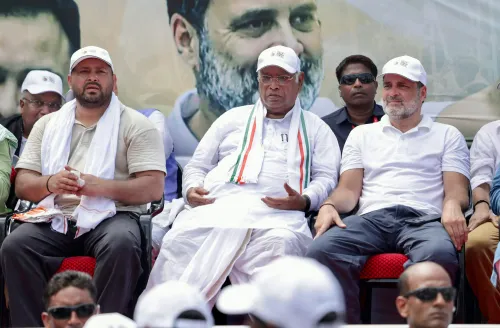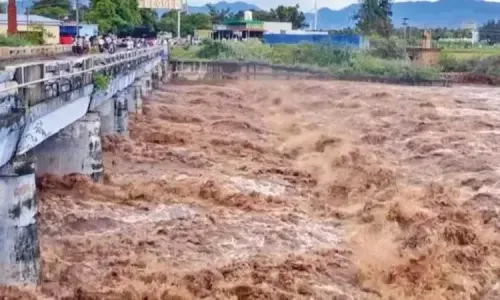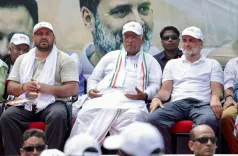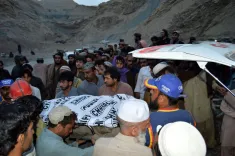Is The Third Eye Awakening? The Increasing Significance of the Pak-Afghan Region
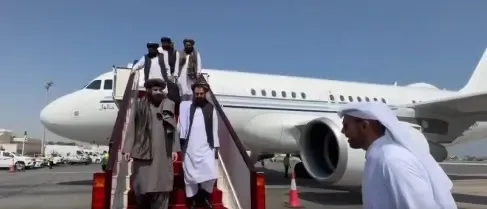
Synopsis
Key Takeaways
- Afghanistan remains a crucial geopolitical player.
- The resurgence of the Taliban complicates regional stability.
- India must navigate its diplomatic relations carefully.
- China and Russia's involvement in Afghanistan poses new challenges.
- Maintaining vigilance against Pakistan's influence is essential.
New Delhi, Oct 19 (NationPress) Afghanistan, often referred to as the 'geographical pivot of history', is once again proving its significance as indications of a renewed Cold War are emerging on the horizon of this nation. In the 19th-century rivalry known as the 'Great Game' between the British and Russian empires, Afghanistan served as a crucial link to Central Asia and acted as a buffer zone between the two superpowers.
The rise of the Kabul Emirate in 2021 has once more set the stage for a new geopolitical landscape, with China and Russia cultivating the Afghan regime, while former US President Donald Trump sought Pakistan's cooperation for establishing a significant American Naval Base at the Port of Pasni along the Arabian Sea.
This US initiative aims to mitigate the influence of Gwadar Port located in Baluchistan, which has developed as part of the China-Pakistan Economic Corridor (CPEC). India must remain vigilant regarding events unfolding in the Pakistan-Afghanistan region, historically a hotspot for jihad-driven violence that Pakistan has exploited to perpetuate cross-border terrorism against India. The intricate diplomatic dance by Pakistan to maintain favorable relations with the US, China, and Russia simultaneously is also noteworthy.
A glance at Afghanistan's recent political history reveals what India might anticipate from this nation with a tumultuous past. Afghanistan has the unique distinction of having forced the withdrawal of both the Soviet and US armies from its territory, achieved through an 'asymmetric war' of attrition.
After the Soviet invasion of Afghanistan in 1979, the militant resistance initially stemmed from internal Islamic terror factions under the control of Pakistan’s ISI, particularly the Hizbul Mujahideen (HuM), but was later bolstered by support from MI6 and the CIA, as Pakistan was allied with the US-led West.
The armed struggle against Soviet forces was driven by the rallying cry of jihad, receiving full backing from the US. However, internal opposition was insufficient to significantly weaken Soviet forces, leading Prime Minister Benazir Bhutto to deploy the Taliban to Afghanistan in 1993 to stabilize the situation.
The Taliban emerged as a 'radical' Islamic group, largely composed of individuals from Deobandi Madrasas in Pakistan that adhered to an extremist interpretation of Islam, harkening back to the Wahhabi revolt against British encroachment on Muslim territories in the 19th century.
Prominent scholars of the time, including Al Tijani in Algeria, Abdul Wahab in Arabia, and Shah Waliullah in India, called for jihad against Western powers, attributing the decline of Islamic governance to the rulers’ deviation from strict religious tenets.
Radical Islamic terrorism thus intertwines with Islamic revivalism. The jihad, which originated in the then-North West Frontier Province (NWFP), endured for many years but ultimately faltered against superior British military power, leaving the Khyber Pakhtunkhwa-Afghanistan corridor radicalized, with lasting implications observable today.
Both KP and Baluchistan witness considerable unrest against the Pakistani regime due to the pro-US posture of the Pakistani military. Returning to the Taliban, they quickly seized control of Kabul with their ruthless tactics and, backed by Pakistan, established the Emirate in Afghanistan in 1996.
However, the Taliban-Al Qaeda regime soon turned hostile towards the US, providing a safe haven for Osama bin Laden, who was closely related to Mulla Umar, the Emir. Afghanistan was reportedly involved in the planning of the 9/11 attacks, which triggered the US-led 'war on terror' and the subsequent ousting of the Taliban in late 2001.
The presence of US troops in Afghanistan faced persistent resistance from the Taliban and became a political liability for the US. Pakistan facilitated negotiations between the Taliban and the US in Doha, Qatar, a US ally, leading to the withdrawal of American troops in 2021 and the return of the Kabul Emirate.
Since then, the relationship between the US and the Taliban has remained fraught, as the latter struggles to renounce its extremist ideology. Meanwhile, the strategic partnership between China and Pakistan has resulted in a mutually beneficial arrangement, allowing China to extend its Belt and Road Initiative (BRI) to Afghanistan in exchange for Taliban assurance regarding the treatment of Muslim minorities in China, particularly those in neighboring Uzbekistan.
Given its interests in the Central Asian Republics, Russia stands alongside China. The Moscow Format Consultations, initiated by Russia in 2017, serves as a diplomatic platform for dialogue among Afghanistan's neighbors and other stakeholders, gaining traction particularly after Trump’s remarks on taking over the Bagram airbase, which served as the command center for US military operations during the 'war on terror'.
In a recent Moscow Format meeting held on October 7, both India and Pakistan attended, marking Afghanistan’s presence as a member for the first time, where any foreign military presence in Afghanistan was opposed.
During Trump’s presidency, efforts to reestablish a US foothold in Afghanistan intensified, especially in light of Middle Eastern developments where military tensions between Iran and Israel saw China and Russia align with Iran due to their political opposition to the US, as Iran sought to strengthen ties with Hamas, intensifying threats to Israel.
Shia fundamentalism stands in stark opposition to Western capitalism, while Hamas, a Sunni radical entity, similarly views the US as its primary adversary. The unrest in the Middle East has already been shifting geopolitics towards a new Cold War, prompting Trump, eager to present himself as a 'global peacemaker', to initiate a ceasefire plan between Hamas and Israel as a precursor to peace negotiations.
Trump previously claimed to have facilitated a ceasefire following military skirmishes between India and Pakistan, both nuclear powers, triggered by a terrorist attack in Pahalgam. India’s stance has been to accept a ceasefire request from Pakistan's DGMO. India has rightly supported the US President's Gaza initiative, endorsed by Prime Minister Narendra Modi, aligning with India's policy of advocating for peace talks in resolving global military conflicts, such as the Ukraine-Russia war, while promoting humanitarian concerns jeopardized in Gaza.
India remains vigilant against Pakistan, which is adeptly maneuvering between the US and China to maintain its terror efforts against India. India's strategy of fostering bilateral relationships globally to safeguard its security and economic interests—without aligning with any singular world power—appears to be yielding positive results.
As a significant global power, India is justified in viewing the international landscape as a multipolar order, pursuing peace and humanity through a lens of strategic autonomy. India acknowledges the hostile Sino-Pak alliance as a primary concern in its national security agenda, particularly after observing military cooperation between China and Pakistan during the Indo-Pak conflict following Pahalgam.
India must brace for potential coordinated offensives from these two antagonistic neighbors in the future. It is essential to enhance diplomatic and geopolitical strategies to counter these adversaries at a time when they are fostering an anti-India sentiment in neighboring countries.
Active participation in both BRICS and Quad, alongside support for Moscow Format Consultations, aligns with this long-term objective.
The recent outreach to the Taliban administration, highlighted by the inaugural visit of its Foreign Minister Amir Khan Muttaqi to India on October 10, is part of India's strategy to limit Pakistan's influence in Afghanistan. Despite not formally recognizing the Taliban regime, India accorded Muttaqi full diplomatic honors, and External Affairs Minister S. Jaishankar engaged in discussions with him.
During his visit, the Afghan representative reiterated that Afghan territory would not be used for militant activities against any nation, serving as a deterrent against Pakistan's tactics of deploying Islamic radicals in cross-border terror operations targeting India. India firmly upholds Afghanistan's sovereignty against Pakistan's transgressions along the Pak-Afghan border.
Muttaqi's visit to Darul Uloom, Deoband—the birthplace of puritanical Islamic ideology established in 1867 after the Wahhabi revolt's failure—further signifies the complex dynamics at play.
While the Taliban's radical stance offers Pakistan an opportunity to align with it on religious grounds, the Taliban’s anti-US sentiments have deterred it from endorsing Pakistan's efforts to strengthen ties with the Pentagon.
The ongoing antagonism of the Tehreek-e-Taliban Pakistan (TTP) towards the Pakistani government is indicative of this situation. Regardless, India remains challenged by the need to counter Pakistan's influence within Afghanistan.
(The writer is a former Director of the Intelligence Bureau)

